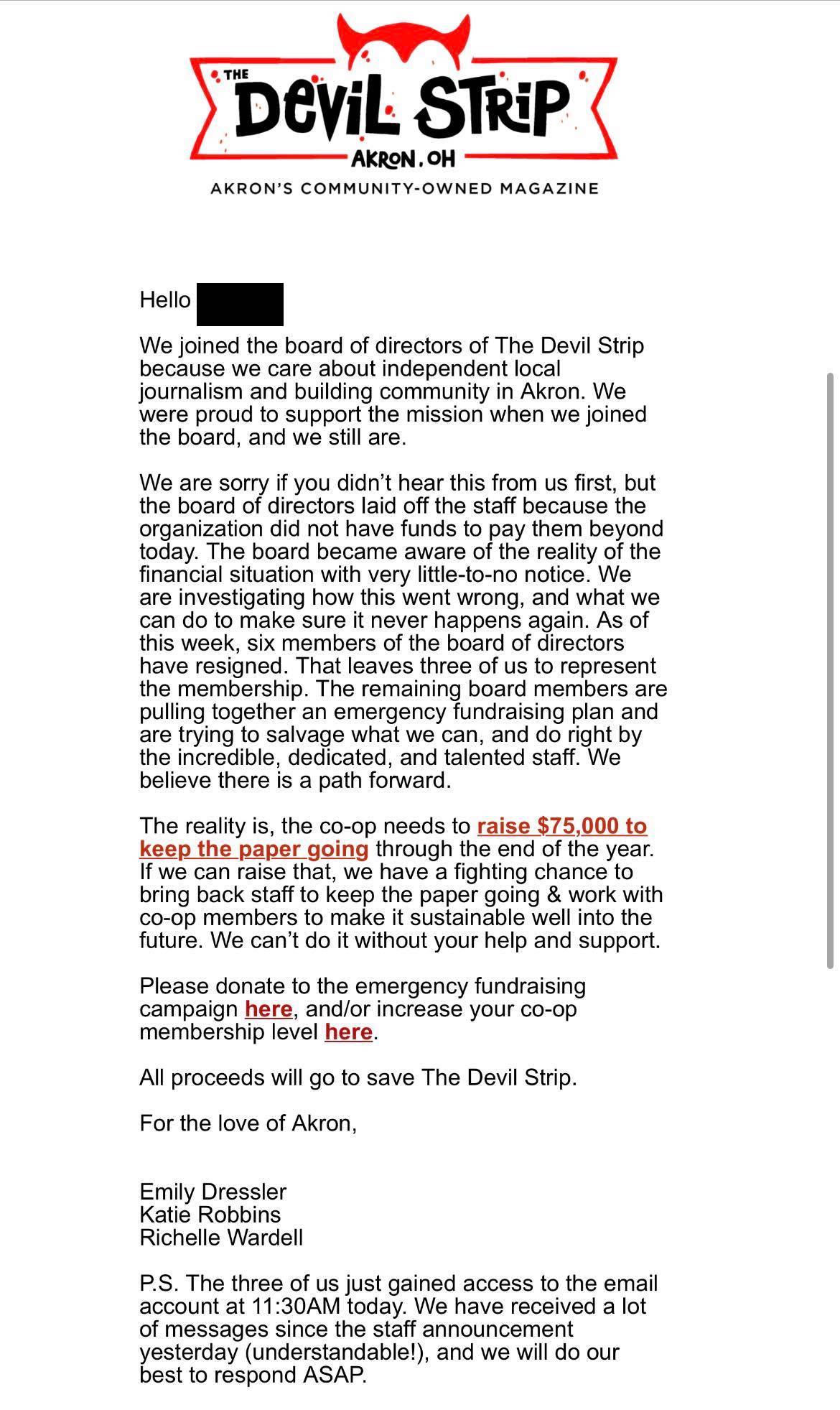
Akron, Ohio’s “community-owned magazine,” The Devil Strip, gained attention for its unusual business model: It claimed to be the “first community-owned local news cooperative in the United States.”
It was a model built on community trust — which made it extra-surprising when, on Monday, The Devil Strip’s staff announced on social media that the site had been shut down, and they had all been laid off. A statement did not appear on The Devil Strip’s website. Its founder, Chris Horne, who was asked to take “a sabbatical” in September, posted this tweet thread.
— The Devil Strip (@akrondevilstrip) October 18, 2021
Can a community-owned site just … do that: In becoming a co-op in 2019, The Devil Strip said its “vested co-owners” (each of whom had donated at least $330) would be able to “vote on important issues” about the magazine, following “the ‘one person, one share, one vote’ principle.” But those co-owners — there were 94 of them — weren’t told The Devil Strip was in financial trouble, much less consulted on a path forward.
The Devil Strip’s staff of nine — including two reporters whose salaries were paid in part by Report for America — found out on Friday that there was no more money to pay them beyond that week’s payroll.
“We took the weekend and learned Monday morning that the majority of the board of directors had resigned,” Jes Holbrook, the publication’s editor-in-chief, told me. “That’s when the staff was laid off.”
In the comments of The Devil Strip’s Facebook page, readers expressed confusion: “What’s the point of a co-op if the people have no say?” one wrote. Another: “What? Not even a chance for us owners to help raise additional funds?”
“No indication at the annual meeting over the summer of 2021 that there was concern, but no financial recap despite my request before the meeting,” another co-owner recalled.
A follow-up email to members and co-owners on Tuesday created more confusion. The three remaining members of The Devil Strip’s board of directors said they were launching a GoFundMe to raise $75,000 to “have a fighting chance” to rehire staff (who have not said if they will return) and keep the publication going.

Some co-owners commented on Facebook that they needed more financial transparency before they would contribute. (“I do not want you to fail. I want to contribute additional funds, however we need more details before we go blindly. This team needs held accountable for the lack of transparency and hasty decisions. Why are we here right now? What got us to this place?“) But in its first six hours, the GoFundMe raised $4,796 from 60 donors.
Any Ohio resident who was 18 or over could be a co-owner of The Devil Strip as long as they were paying at least $12 a year. Once someone had paid $330 in total, they became a “lifetime, permanent co-owner” who could “vote on important issues that shape our future, join a committee or serve on our our Board of Directors.”
The Devil Strip was founded by Chris Horne, who researched community funding models for journalism as a 2019 Knight Journalism Fellow at Stanford.
On September 26, The Devil Strip had announced that Horne was taking a “sabbatical.” “Because TDS is run by a dedicated staff and board of directors, fundamentally nothing will change,” the site’s Board of Directors said in a statement at the time.
Horne and The Devil Strip’s board members did not respond to my interview requests. But in a Medium post, “The truth about my sabbatical,” published on September 27, Horne wrote:
I wanted The Devil Strip to become a cooperative because I believe in shared ownership, governance and responsibility, but then I became a roadblock. I wouldn’t let go and let our staff and board do their jobs.
Some of that is my ego. Most of it is mental illness. I’ll unpack that more during my sabbatical, but right now I’ll say the more important The Devil Strip has become to more people, the more pressure I’ve felt not to let anyone down … because I base my self-worth on what I can do for others. […]
My sabbatical is also the co-op’s next step. Just as I have to figure out who I am outside of The Devil Strip, The Devil Strip has to figure out what it is without me. Good news! Our team, our contributors, our board and our member-owners don’t need me because Chris Horne has never been what makes The Devil Strip special. They are.
Julie Cajigas, a professor of practice at the University of Akron, adviser to its student paper, and a co-owner of The Devil Strip, said the publication fills gaps in local news coverage. She recalled a series, “Faces of the Homeless,” that profiled a homeless mother who had a baby about the same age as Cajigas’s baby. “I reached out to that mom and was able to do some things for and with her,” she said. “I feel like [other media outlets] are not telling those stories … to lose something like [The Devil Strip] is really significant to the community.”
In addition to revenue from its members, The Devil Strip had received a total of $589,652 in philanthropic funding as of the end of 2020, according to its Donors page. Some of the larger contributors to that pool of funds included the Knight Foundation, which gave a total of $225,000 as of the end of 2020, and the Lenfest Institute on behalf of the Facebook Journalism Project, which gave $100,000. Any 2021 donations are not listed on The Devil Strip’s site.
This post was updated several times on Tuesday and Wednesday.